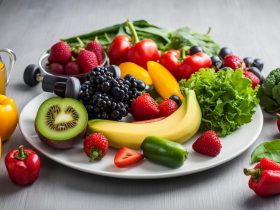When it comes to maintaining a healthy lifestyle, there’s nothing more important than finding the right balanced between fitness and nutrition. A well-rounded approach to diet and exercise is key to achieving optimal health and wellness. Whether your goal is weight loss or simply living a healthier life, this guide will provide you with practical tips and expert advice to help you stay on track.
By incorporating a balanced approach to fitness and nutrition, you can ensure that your body is getting the nutrients it needs to thrive. From making smart choices when it comes to what you eat, to finding exciting ways to stay active, this guide has you covered.
Key Takeaways:
- Fitness and nutrition go hand in hand for overall health and well-being.
- Find the right balance between diet and exercise to achieve your desired weight loss goals.
- Prioritize healthy living by incorporating fruits, vegetables, whole grains, and lean proteins into your daily diet.
- Listen to your body and customize your food choices to meet your unique needs and preferences.
- By embracing balance and making conscious decisions, you can stay on track with your fitness goals while nourishing your body.
What is Balanced Fitness and Nutrition?
Balanced nutrition involves giving your body the nutrients it needs to support daily activities and long-term health. It’s about maintaining a diet that includes a variety of foods, providing a balance of calories, vitamins, minerals, carbohydrates, protein, fat, and hydration.
To achieve balanced fitness nutrition, it’s important to focus on incorporating fruits and vegetables, whole grains, nuts and legumes, and lean proteins into your daily meals. These food groups are rich in essential nutrients that support your overall health and well-being.
The Dietary Guidelines for Americans emphasize the importance of following a healthy dietary pattern and customizing food choices to meet daily food group requirements. This means prioritizing nutrient-dense foods while limiting those high in added sugars, saturated fat, and sodium. By practicing balanced nutrition, you can give your body the fuel it needs to thrive.
The Benefits of Balanced Fitness and Nutrition
- Improved physical and mental well-being
- Enhanced energy levels for daily activities and exercise
- Weight management and maintenance
- Reduced risk of chronic diseases, such as heart disease and diabetes
- Increased immune function
By prioritizing balanced nutrition and making it a part of your lifestyle, you can enjoy these benefits and support your goals for a healthier, happier life.
Table: Essential Nutrients for Balanced Nutrition
| Nutrient | Main Sources | Functions |
|---|---|---|
| Carbohydrates | Whole grains, fruits, vegetables | Provide energy for physical activities |
| Protein | Lean meats, poultry, fish, legumes, dairy products | Build and repair tissues, support immune function |
| Fat | Nuts, seeds, avocados, oils | Aid in nutrient absorption, provide energy |
| Vitamins | Fruits, vegetables, whole grains | Support various bodily functions |
| Minerals | Leafy greens, nuts, seeds, dairy products | Regulate body processes, maintain healthy bones |
| Water | N/A | Essential for hydration, digestion, and overall body function |
By ensuring a balance of these essential nutrients in your diet, you can achieve optimal health and well-being through balanced nutrition.
Fundamentals of Balanced Nutrition
The fundamentals of balanced nutrition lay the groundwork for a healthy and well-rounded diet. By focusing on incorporating a variety of essential food groups into your meals, you can ensure that your body receives the necessary nutrients it needs to thrive. These fundamental elements include:
- Fruits and vegetables: These nutrient-rich foods are packed with vitamins, minerals, and antioxidants that support overall health and well-being.
- Grains: Whole grains, such as brown rice, quinoa, and whole wheat bread, provide fiber, energy, and essential nutrients.
- Dairy: Dairy products like milk, cheese, and yogurt are excellent sources of calcium, protein, and other important nutrients.
- Protein: Including lean sources of protein like chicken, fish, tofu, and legumes helps build and repair tissues, support immune function, and maintain muscle mass.
- Oils: Healthy fats found in olive oil, avocados, nuts, and seeds provide essential fatty acids and contribute to overall well-being.
By incorporating these food groups into your meals in appropriate portions, you can achieve a balanced diet that supports your body’s needs. It’s also important to consider nutrient density when planning your meals. Nutrient-dense foods, such as leafy greens, berries, nuts, and fish, provide a high concentration of vitamins, minerals, and other beneficial compounds per calorie. This ensures that you’re getting the most nutritional value out of your food choices.
“A balanced diet is like a symphony, where the different food groups come together to create a harmonious and nourishing experience for your body.” – Unknown
Benefits of Balanced Fitness and Nutrition
Opting for a balanced nutrition approach offers numerous benefits for your overall health and well-being. By incorporating a variety of foods from different food groups, you can:
- Promote optimal growth and development
- Maintain a healthy weight
- Support healthy digestion
- Reduce the risk of chronic diseases, such as heart disease, diabetes, and certain cancers
- Enhance energy levels and mental clarity
- Boost immune function
- Improve sleep quality
Remember, balance is key. Aim to include a variety of colorful fruits and vegetables, whole grains, lean proteins, and healthy fats in your meals. Customize your food choices to suit your tastes and preferences, and listen to your body’s hunger and fullness cues. By prioritizing the fundamentals of balanced nutrition, you can nourish your body and support your overall health.
The Importance of Consistent Dietary Patterns and Nutrient Density
Consistent dietary patterns and nutrient density are two key factors that contribute to maintaining balanced nutrition and overall health. By following dietary guidelines and making healthy choices, you can optimize your nutrition and enhance your well-being.
Consistent Dietary Patterns
Consistent dietary patterns refer to the balance of food quantities, types, combinations, and varieties that you consume over your lifetime. It’s important to focus on the combination of foods and beverages that make up your whole diet over time, rather than fixating on single foods or eating occasions. By following consistent, healthful dietary patterns, you can promote overall health and ensure that your body receives the nutrients it needs.
Nutrient Density
Nutrient density is an important aspect of balanced nutrition. It refers to the amount of nutrients in food relative to the number of calories it contains. Choosing nutrient-dense foods and beverages ensures that you’re getting essential vitamins, minerals, and other health-promoting components without excessive calories. By prioritizing nutrient density, you can optimize your nutrition and support your overall well-being.
| Food | Calories | Nutrients | |
|---|---|---|---|
| 1 | Spinach | 7 | Iron, Vitamin K |
| 2 | Avocado | 160 | Healthy Fats, Fiber |
| 3 | White Bread | 80 | Empty Calories |
| 4 | Salmon | 206 | Omega-3 Fatty Acids, Protein |
In the table above, you can see the contrast between nutrient-dense foods like spinach and avocado, and less nutrient-dense options like white bread. By choosing foods that are rich in nutrients and low in empty calories, you can make sure that your diet is providing the essential components your body needs.
“Nutrient density is about getting the biggest nutritional bang for your caloric buck.” – Harvard School of Public Health
By prioritizing consistent dietary patterns and nutrient density in your food choices, you can ensure that your body receives the necessary nutrients for optimal health. Remember to follow dietary guidelines, make healthy choices, and listen to your body’s needs to support your overall well-being.
Nutrition is Important for Fitness
Nutrition plays a vital role in fueling exercise performance and supporting overall fitness. Eating a well-balanced diet that includes the right types of food at the right times of the day can enhance your physical abilities. A healthy breakfast, rich in complex carbohydrates and protein, can replenish your blood sugar and provide the energy you need for workouts. Choosing the right carbohydrates, such as whole grains and fruits, can fuel your body and help stabilize blood sugar levels. Including lean protein sources, such as poultry, red meat, fish, dairy, legumes, and eggs, supports muscle building and repair. Filling half your plate with fruits and vegetables provides essential nutrients, fiber, and hydration. Incorporating healthy fats, such as nuts, seeds, avocados, and oils, helps provide essential fatty acids and calories for energy. Proper nutrition before and after exercise, along with maintaining a balanced diet, can optimize your fitness and performance.
The Impact of Nutrition on Exercise Performance
Nutrition has a direct impact on exercise performance. The food you eat provides the fuel and nutrients necessary for your muscles to work efficiently during physical activity. By consuming a well-rounded diet that includes carbohydrates, protein, fruits, vegetables, and healthy fats, you can optimize your energy levels and enhance your athletic performance.
“Fueling your body with the right nutrients before and after exercise can make a significant difference in your fitness journey.” – Fitness Expert
The Role of Carbohydrates and Protein
Carbohydrates are the primary source of energy for your muscles. Complex carbohydrates, found in whole grains, fruits, and vegetables, release energy slowly, providing a steady supply during exercise. Protein, on the other hand, is essential for muscle building and repair. Including lean protein sources in your diet helps support muscle growth and recovery, ensuring that your body can adapt and become stronger over time.
| Carbohydrates | Protein | Fruits and Vegetables | Healthy Fats |
|---|---|---|---|
| Whole grains | Poultry | Fruits | Nuts |
| Fruits | Red meat | Vegetables | Seeds |
| Vegetables | Fish | Avocados | |
| Dairy | Oils | ||
| Legumes | |||
| Eggs |
By incorporating these food groups into your meals and snacks, you can provide your body with the nutrients it needs to support optimal fitness and performance.
Get off to a Good Start
Starting your day with a healthy breakfast sets the tone for balanced nutrition and optimal energy levels. It’s important to choose breakfast options that provide a combination of complex carbohydrates, fiber, and protein. This can help replenish blood sugar levels, fuel your muscles and brain, and keep you feeling full for longer.
Opt for whole-grain cereals, oatmeal, or oat bran instead of sugar-laden options. Add protein sources like milk, yogurt, or chopped nuts to enhance the nutritional value. If you prefer toast, opt for whole-grain bread and pair it with protein sources like eggs or peanut butter. By making mindful choices when it comes to breakfast, you can kickstart your day on a healthy note.
Why is a Healthy Breakfast Important?
A healthy breakfast provides the necessary fuel to jumpstart your metabolism and keep your energy levels steady throughout the day. By including complex carbohydrates, fiber, and protein in your morning meal, you’re setting yourself up for success. Complex carbohydrates, such as whole grains, release energy slowly, providing a steady stream of fuel. Fiber helps maintain stable blood sugar levels and promotes healthy digestion. Protein helps build and repair tissues, supports muscle growth, and keeps you feeling satisfied. By combining these nutrients in your breakfast, you’re equipping your body for a productive and energized day.
| Benefits of a Healthy Breakfast | Complex Carbohydrates | Fiber | Protein |
|---|---|---|---|
| Steady energy throughout the day | Slow-releasing fuel | Maintains stable blood sugar levels | Supports muscle growth and repair |
| Improved concentration and focus | Enhances brain function | Promotes satiety | Reduces cravings |
| Weight management | Keeps you feeling full | Aids in digestion | Helps maintain muscle mass |
A healthy breakfast doesn’t have to be complicated or time-consuming. Simple options like a bowl of oatmeal topped with berries and a sprinkle of nuts, Greek yogurt with granola and sliced banana, or a veggie omelet with whole-grain toast can provide the nutrients you need to start your day off right. By prioritizing a healthy breakfast, you’re setting the stage for balanced nutrition and overall well-being.

Count on the Right Carbohydrates
When it comes to fueling your body with energy, carbohydrates play a crucial role. However, not all carbohydrates are created equal. It’s important to choose the right type of carbohydrates to support optimal performance and overall health. Instead of relying on simple carbs found in sweets and processed foods, focus on incorporating complex carbs into your diet from whole grains, fruits, vegetables, and beans.
Whole grains, such as brown rice, quinoa, and whole wheat bread, provide sustained energy and help stabilize blood sugar levels. They are also rich in vitamins, minerals, and fiber, contributing to your overall well-being. Fruits and vegetables are packed with complex carbs as well, along with essential nutrients and antioxidants. They are a great addition to your diet for both energy and overall health.
To ensure you’re counting on the right carbohydrates, prioritize whole grains, fruits, and vegetables as the main sources of your carb intake. Incorporate them into your meals and snacks to fuel your body with sustained energy and essential nutrients. By making this simple adjustment to your diet, you can optimize your energy levels and support your fitness routine.
Benefits of Complex Carbohydrates:
- Provide sustained energy
- Stabilize blood sugar levels
- Rich in vitamins, minerals, and fiber
- Support overall health and well-being
- Contribute to optimal fitness performance
| Complex Carbohydrate Sources | Description |
|---|---|
| Whole grains | Brown rice, quinoa, whole wheat bread |
| Fruits and vegetables | Berries, apples, leafy greens, broccoli |
| Beans and legumes | Black beans, chickpeas, lentils |
“Choosing the right carbohydrates is essential for providing your body with sustained energy and supporting your overall health and fitness goals.” – Fitness Expert
By counting on the right carbohydrates, you can fuel your body with the energy it needs to power through your workouts and maintain overall well-being. Remember to choose complex carbs from sources like whole grains, fruits, vegetables, and beans to optimize your nutrition and enhance your fitness journey.
Pack Protein into Your Snacks and Meals
Protein is a crucial component for muscle building and repair, making it an essential part of your fitness journey. By incorporating lean protein sources into your snacks and meals, you can support your fitness goals and optimize your results. Lean protein sources include poultry, red meat, fish, dairy products, legumes, eggs, and plant-based alternatives. These foods provide essential amino acids that contribute to muscle maintenance, growth, and recovery. Aim to consume about 0.8 grams of protein per kilogram of body weight daily, adjusting for individual needs.
To ensure you’re getting enough protein, it’s helpful to plan protein-rich snacks and meals throughout the day. Here are some ideas to pack protein into your diet:
Protein-Packed Snack Ideas
- Greek yogurt topped with nuts and berries
- Hard-boiled eggs
- Protein bars or shakes
- Roasted chickpeas
- Cottage cheese with fruit
Protein-Rich Meal Ideas
- Grilled chicken or fish with steamed vegetables
- Quinoa salad with mixed greens and grilled tofu
- Egg white omelet with spinach, mushrooms, and feta cheese
- Lean beef or turkey burgers on whole grain buns
- Lentil soup with a side of whole grain bread
| Lean Protein Sources | Protein Content (per 100g) |
|---|---|
| Chicken Breast | 31g |
| Tuna | 30g |
| Eggs | 13g |
| Greek Yogurt | 10g |
| Black Beans | 21g |
Remember to choose lean protein sources and include a variety of options in your diet to maximize the benefits. By packing protein into your snacks and meals, you can support muscle building and repair, optimize your fitness routine, and enhance your overall health.

Boost Your Fruit and Vegetable Intake
Fruits and vegetables are essential components of a balanced nutrition plan. They are rich in fiber, vitamins, minerals, and antioxidants, all of which contribute to your overall health and well-being. By increasing your intake of fruits and vegetables, you can optimize your fitness journey and support your body’s needs.
eat the rainbow
One way to boost your fruit and vegetable intake is to “eat the rainbow.” This means incorporating a variety of colorful produce into your meals and snacks. Different colors indicate different nutrients, so by consuming a diverse range of fruits and vegetables, you can benefit from their full nutritional spectrum. For example:
- Red fruits and vegetables, such as tomatoes and watermelon, are packed with lycopene, a powerful antioxidant known for its potential health benefits.
- Orange fruits and vegetables, like carrots and sweet potatoes, are high in beta-carotene, which is converted into vitamin A in the body and supports healthy vision.
- Green leafy vegetables, such as spinach and kale, are excellent sources of vitamins A, C, and K, as well as minerals like calcium and iron.
Dried fruits
By incorporating dried fruits as snacks and raw vegetables as sides, you can easily increase your fruit and vegetable intake throughout the day. Dried fruits provide a convenient and portable option, while raw veggies offer a refreshing crunch and a boost of hydration. Remember to fill half your plate with fruits and vegetables to ensure you’re getting an adequate amount of these nutritious foods.
“Eating fruits and vegetables is one of the best ways to nourish your body. They provide essential nutrients while also offering natural hydration and fiber. Incorporating a variety of colors ensures you’re getting a wide range of vitamins and minerals to support your fitness goals.”
Incorporating more fruits and vegetables into your diet doesn’t have to be complicated or time-consuming. Get creative with your meal planning and try new recipes that prioritize plant-based ingredients. Smoothies, salads, stir-fries, and roasted vegetable medleys are just a few examples of delicious and nutritious ways to increase your fruit and vegetable intake.
| Fruit | Nutrients |
|---|---|
| Apples | Fiber, vitamin C, antioxidants |
| Bananas | Potassium, vitamin B6, fiber |
| Oranges | Vitamin C, folate, antioxidants |
By prioritizing fruits and vegetables in your diet, you can reap the benefits of their nutritional value and support your fitness and wellness goals. Experiment with different flavors and textures to find enjoyable ways to incorporate these vital foods into your daily routine. Remember, a diverse and colorful plate is a key component of a healthy and balanced diet.
Conclusion
Achieving a healthy lifestyle requires finding balance in your fitness and nutrition journey. By incorporating the tips and advice from this guide, you can make informed choices to prioritize your well-being. Remember to listen to your body, customize your food choices, and enjoy the process of nourishing your body while working towards your fitness goals.
Embracing balance is essential for long-term success. Strive to include a variety of nutrient-dense foods like fruits, vegetables, whole grains, lean proteins, and healthy fats in your diet. This will provide the necessary fuel for your workouts and support optimal health.
By maintaining a balanced approach to fitness and nutrition, you can achieve your fitness goals and enhance your overall well-being. Remember that it’s not just about the end result but the journey towards optimal health. Prioritize balance, make conscious decisions, and take pleasure in nourishing your body. By doing so, you’ll be on the path to a healthier and happier you.
FAQ
What is balanced nutrition?
Balanced nutrition involves consuming a variety of foods that provide the necessary nutrients for overall health and well-being. This includes fruits and vegetables, whole grains, lean proteins, and healthy fats.
How can I incorporate fruits and vegetables into my diet?
You can incorporate fruits and vegetables into your diet by filling half your plate with them during meals, choosing them as snacks, and “eating the rainbow” to benefit from their full range of nutrients.
What role does protein play in fitness and nutrition?
Protein plays a critical role in muscle building, repair, and overall health. Including lean protein sources such as poultry, red meat, fish, dairy, legumes, eggs, and plant-based alternatives in your diet supports optimal muscle function.
How can I start my day on a healthy note?
Starting your day with a healthy breakfast sets the tone for balanced nutrition and optimal energy levels. Choose options that provide a combination of complex carbohydrates, fiber, and protein, such as whole-grain cereals, oatmeal, or toast with protein sources like eggs or peanut butter.
What are the right carbohydrates to fuel my body for exercise?
Instead of relying on simple carbs found in sweets and processed foods, focus on eating complex carbohydrates from whole grains, fruits, vegetables, and beans. Whole grains provide sustained energy, stability to blood sugar levels, and essential vitamins and minerals.
How can I ensure a balanced approach to fitness and nutrition?
By following the guidelines provided in this guide, such as incorporating a variety of foods into your diet, customizing food choices to meet your needs, and finding joy in the journey towards optimal health and fitness, you can maintain a balanced approach to fitness and nutrition.
Related Articles
- Body Neutrality: The Key to a Balanced Self-Image
- Effective Ways to Lose Weight: A Comprehensive Guide
- A Comprehensive Guide to Effective Muscle-Building Techniques
- Home Workouts Made Easy: A Guide to Staying Active at Home










Leave a Reply